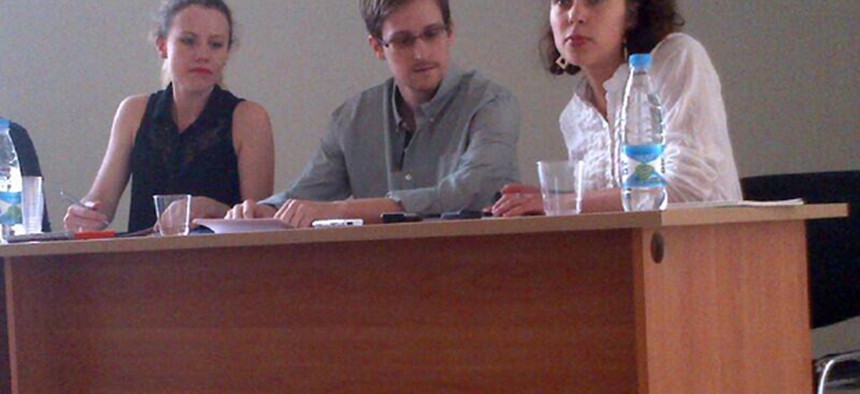Edward Snowden Says He Wants to Stay in Russia, for Now

Edward Snowden, flanked by Sarah Harrison of WikiLeaks (right) and an unidentified woman. Tanya Lokshina/Human Rights Watch
The former intelligence contractor said he doesn't intend to harm the United States.
Edward Snowden intends to apply for asylum in Russia, according to Human Rights Watch's Tanya Lokshina. For the past half-hour, Lokshina has been meeting with Snowden—along with members of a handful of other human-rights organizations—in his first public appearance since fleeing to Moscow.
Snowden said he had received a formal offer of asylum from Venezuela and hoped eventually to wind up there. But because of his travel limitations, for now he's looking to stay put.
Russian President Vladimir Putin earlier this month said Snowden was welcome to stay as long as he stopped leaking classified information, a condition that Snowden rejected out of hand.
"I remain free and able to publish information that serves the public interest," he wrote in on July 2.
In recent weeks, Russia seemed to be putting pressure on Snowden to leave, with a high-ranking lawmaker urging him to accept Venezuela's offer of asylum. Days later, the member of parliament, Alexei Pushkov, tweeted that Snowden had in fact accepted the offer—and then promptly deleted the tweet, setting off speculation over Snowden's intentions.
According to Ellen Barry of The New York Times, Snowden seems aware that his fate depends on not crossing Putin again:
"No actions I take or plan are meant to harm the US," Snowden says, so Putin's condition poses no obstacle, @TanyaLokshina @hrw reports
— Ellen Barry (@EllenBarryNYT) July 12, 2013
More to come.
Update: WikiLeaks has released the full statement read by Snowden during the meeting. In part:
I announce today my formal acceptance of all offers of support or asylum I have been extended and all others that may be offered in the future. With, for example, the grant of asylum provided by Venezuela’s President Maduro, my asylee status is now formal, and no state has a basis by which to limit or interfere with my right to enjoy that asylum. As we have seen, however, some governments in Western European and North American states have demonstrated a willingness to act outside the law, and this behavior persists today. This unlawful threat makes it impossible for me to travel to Latin America and enjoy the asylum granted there in accordance with our shared rights.
This willingness by powerful states to act extra-legally represents a threat to all of us, and must not be allowed to succeed. Accordingly, I ask for your assistance in requesting guarantees of safe passage from the relevant nations in securing my travel to Latin America, as well as requesting asylum in Russia until such time as these states accede to law and my legal travel is permitted. I will be submitting my request to Russia today, and hope it will be accepted favorably.





